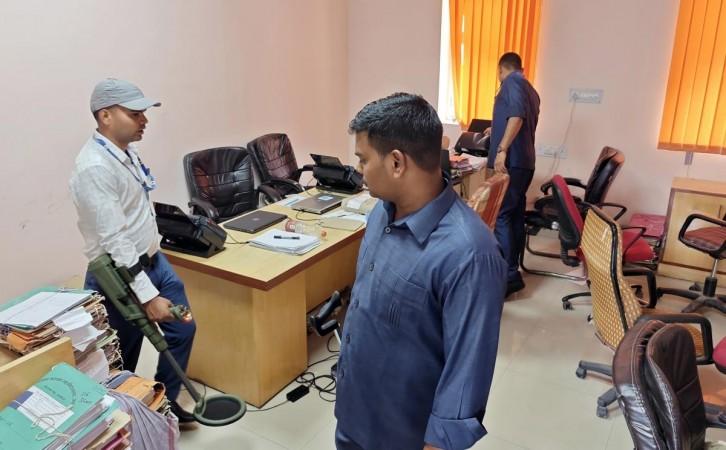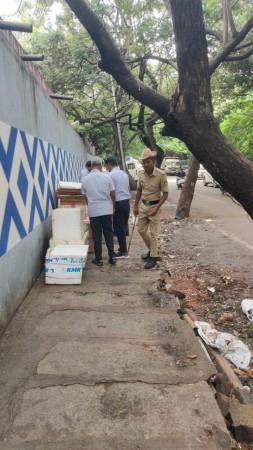
Jaipur was thrust into a state of heightened security on a recent Saturday when bomb threats were directed at two critical sites: the Jaipur International Airport and the Chief Minister's Office (CMO).
The threat, which was communicated via email to the airport's official address, warned that both locations would be "blown up within one to two hours." This alarming message prompted an immediate and comprehensive response from various security agencies, including the police, Central Industrial Security Force (CISF), bomb disposal squads, anti-sabotage units, fire brigade, and civil defense teams.
These agencies quickly cordoned off the areas and conducted thorough searches, utilizing sniffer dogs and reviewing CCTV footage across the airport terminal and its surroundings. Despite the exhaustive search, no explosives or suspicious items were found, and authorities later confirmed the threat to be a hoax.
This incident is part of a troubling pattern of hoax bomb threats that have plagued Jaipur throughout 2025. Public spaces such as schools, courts, metro stations, hospitals, stadiums, and government offices have all been targeted.
The frequency of these threats has raised significant concerns about public safety and the need for more robust mechanisms to trace and prevent such incidents. In recent months, Jaipur has experienced several similar threats.
On June 6, a bomb threat was received at The Palace School in Jaleb Chowk, Jaipur. The email was sent to the school's official email address, but it went unnoticed initially as the school was closed. It was only the following day that the school administration discovered the email and alerted the police.

Similarly, on May 30, threats were directed at the Mansarovar Metro Station and two courts, including the Jaipur Metro Court and the Family Court. The Family Court was searched for approximately four hours, while the Jaipur Metro Court was declared safe after an hour-long search.
The Sawai Mansingh Stadium was also targeted with bomb threats on May 13, May 12, and May 8. On May 9, the Jaipur Metro received a bomb threat via email, which mentioned a plan to blow up both the Jaipur Metro Station and the train following the success of "Operation Sindoor." However, no explosives were found during the investigation.
Pattern of Threats and Security Response
The pattern of these threats is not new to Jaipur. On August 19, 2024, bomb threats were received at two locations in Jaipur on the same day. The threats targeted Delhi Public School at 11 am and Pink Square Mall in Adarsh Nagar at 3 pm. Both sites were thoroughly searched for several hours, but no explosives were discovered.
The local police have noted that this marks the ninth bomb threat the Jaipur airport has received in the past two years. The repeated nature of these threats has raised questions about the effectiveness of current security measures and the need for a stronger mechanism to trace and stop the source of these messages.
In a related development, authorities have been investigating the use of international servers to send these threatening emails. In previous cases involving threats to schools in Rajasthan and Delhi, investigators traced the emails to servers based in Russia.
Specifically, emails to Delhi schools were sent from awariim@mail.ru, while those to Jaipur schools came from instrumenttt@inbox.ru. This international dimension adds a layer of complexity to the investigation, as authorities must navigate cross-border legal and technical challenges to identify and apprehend the perpetrators.
The investigation into these threats has also led to the arrest of Rene Joshilda, a senior consultant in robotics at a private firm. Joshilda is suspected of using her technical skills to orchestrate coordinated cyber hoaxes.
Law enforcement officials allege that she sent at least four bomb threat emails targeting Jaipur's SMS Stadium and other high-profile venues. Investigators have linked her digital trail to threats sent to various government and public spaces across India, including courtrooms and metro stations.
Technological Challenges Ahead
Joshilda reportedly purchased at least 80 virtual mobile numbers and employed VPN services to mask her location. She created multiple email accounts, many under male aliases, and used spoofed IDs to confuse cyber sleuths. Her digital footprint was carefully concealed using advanced anonymization techniques, often employed in sophisticated financial frauds and espionage operations.
Jaipur has faced similar challenges with bomb threats earlier. In 2008, a series of bomb blasts in the city resulted in significant casualties and highlighted the need for improved security measures. Since then, authorities have made efforts to enhance surveillance and response capabilities, but the recent spate of hoax threats indicates that more needs to be done.











